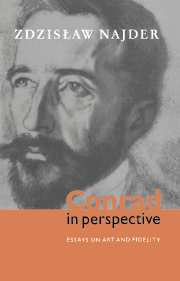Book contents
- Frontmatter
- Contents
- Acknowledgements
- Note on the texts
- List of abbreviations
- 1 Introduction, or confession of a mastodon
- 2 Conrad's Polish background, or from biography to a study of culture
- 3 Joseph Conrad's parents
- 4 Joseph Conrad and Tadeusz Bobrowski
- 5 The Sisters: a grandiose failure
- 6 Lord Jim: a Romantic tragedy of honour
- 7 The Mirror of the Sea
- 8 A Personal Record
- 9 Joseph Conrad's The Secret Agent, or the melodrama of reality
- 10 Conrad, Russia and Dostoevsky
- 11 Conrad and Rousseau: concepts of man and society
- 12 Conrad and the idea of honour
- 13 Joseph Conrad: a European writer
- 14 Joseph Conrad after a century
- 15 Joseph Conrad in his historical perspective
- 16 Fidelity and art: Joseph Conrad's cultural heritage and literary programme
- Notes
- Index
2 - Conrad's Polish background, or from biography to a study of culture
Published online by Cambridge University Press: 07 December 2009
- Frontmatter
- Contents
- Acknowledgements
- Note on the texts
- List of abbreviations
- 1 Introduction, or confession of a mastodon
- 2 Conrad's Polish background, or from biography to a study of culture
- 3 Joseph Conrad's parents
- 4 Joseph Conrad and Tadeusz Bobrowski
- 5 The Sisters: a grandiose failure
- 6 Lord Jim: a Romantic tragedy of honour
- 7 The Mirror of the Sea
- 8 A Personal Record
- 9 Joseph Conrad's The Secret Agent, or the melodrama of reality
- 10 Conrad, Russia and Dostoevsky
- 11 Conrad and Rousseau: concepts of man and society
- 12 Conrad and the idea of honour
- 13 Joseph Conrad: a European writer
- 14 Joseph Conrad after a century
- 15 Joseph Conrad in his historical perspective
- 16 Fidelity and art: Joseph Conrad's cultural heritage and literary programme
- Notes
- Index
Summary
Every Conrad scholar has heard the hypothesis that the central moral theme of Lord Jim, the problem of guilt – or shame – is a reflection of the novelist's own feelings. This idea, developed first by the late Dr Gustav Morf in his pioneering psychoanalytic study of Conrad, has since been reworked many times and in various versions. Generally, it is assumed that Conrad felt guilty of betrayal because he had left his home country and had been writing in a foreign language. This feeling of guilt is supposed to have been awakened, or strengthened, by Eliza Orzeszkowa's acerbic article, published in 1899 –just at the time Conrad was working on the novel.
The consequences of this hypothesis reach far beyond a single Conrad novel and a given period in his life. If accepted, it not only throws a specific light on his creative attitude and gives rise to many analogous hypotheses concerning his other works; it also establishes the categories within which we should look at his childhood and youth. The verification of the hypothesis is clearly a matter of research in Conrad's Polish background. What evidence does this research produce and where does it lead us? I shall briefly recapitulate the results.
The motifs of betrayal, desertion, failing one's duty, and the resulting guilt or shame, occur in Conrad's work from its very beginning. We can see traces of them in Almayer's Folly, they emerge more clearly in An Outcast of the Islands, to become focal in ‘The Lagoon’ and ‘Karain’, and also in The Rescue, begun a couple of years before Lord Jim.
- Type
- Chapter
- Information
- Conrad in PerspectiveEssays on Art and Fidelity, pp. 11 - 17Publisher: Cambridge University PressPrint publication year: 1997
- 1
- Cited by



